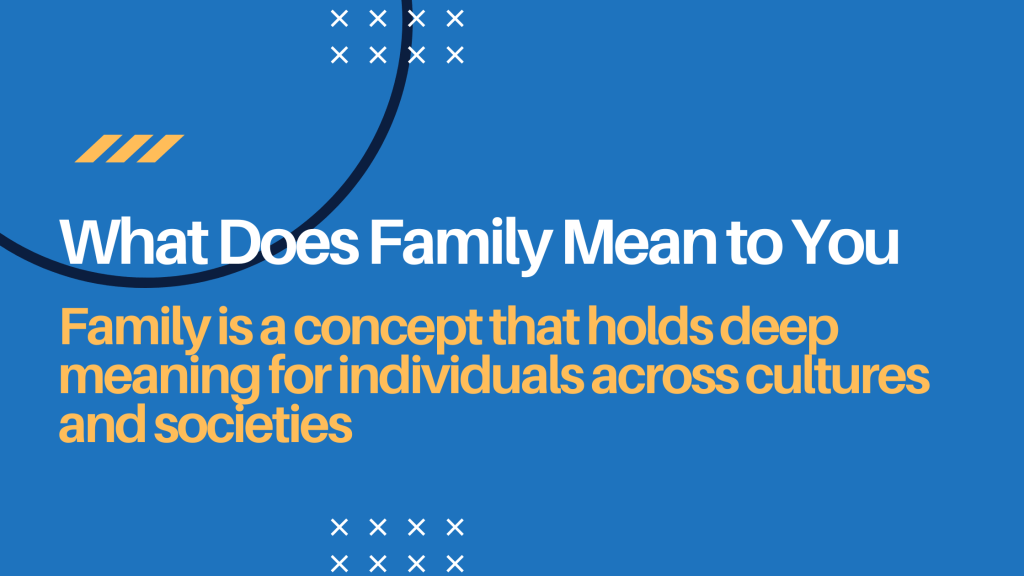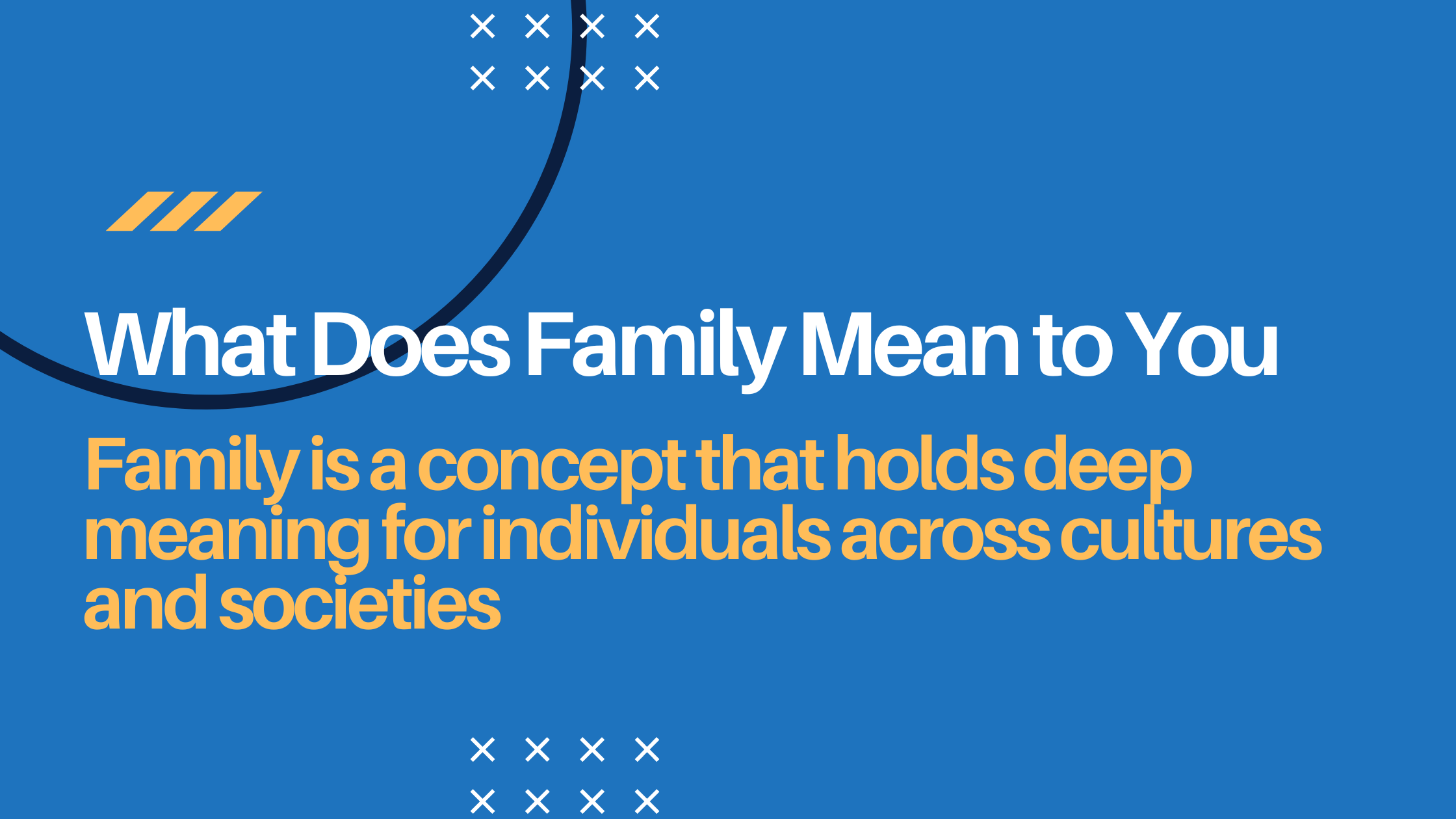Family is a concept that holds deep meaning for individuals across cultures and societies. It encompasses more than just blood relations; it is a fundamental pillar of our lives that provides us with love, support, and a sense of belonging. In this article, we will explore the multifaceted nature of family and delve into what it truly means to each of us.
At its core, family represents a network of relationships and connections that nurture us throughout our lives. It is where we learn about love, compassion, and sacrifice. Family provides a support system that offers comfort during times of hardship and celebrates our joys. It molds us into the individuals we are and helps us navigate the complexities of the world.
Family as a Support System
One of the primary roles of family is to provide unwavering support. It is within the confines of our family that we find emotional refuge. No matter the circumstances, our family members are there to offer a shoulder to lean on and a listening ear.
In addition to emotional support, family also serves as a source of guidance and advice. Our parents, siblings, and extended family members offer wisdom based on their experiences.
They offer guidance on important decisions, lend a listening ear when we need to talk and provide valuable insights that shape our choices and actions. Family members have a deep understanding of our strengths and weaknesses, which enables them to offer tailored advice and help us navigate the challenges of life.
Family as a Source of Identity
Family plays a crucial role in shaping our identity. It connects us to our roots and heritage, grounding us in our cultural and familial history. Family traditions provide us with a sense of continuity and belonging. These traditions create a shared identity and reinforce our values, fostering a deep connection to our heritage.
Moreover, family instills a strong set of values that guide our behavior and shape our character. It is through observing and learning from our family members that we develop a moral compass and learn important life lessons. Family becomes the foundation upon which we build our identities and navigate our place in the world.

Family as a Foundation for Growth
Within the familial embrace, we find the nurturing environment necessary for personal growth and development. Family members support and encourage us to pursue our dreams and aspirations. They help us reach our goals through education, emotional support, and financial aid.
Furthermore, the family offers a wealth of knowledge and experience that we can tap into. Older family members have walked similar paths before us and can offer valuable insights and advice. Their wisdom becomes a guiding light, allowing us to learn from their successes and failures. Family becomes a safe space to explore our potential, take risks, and learn from triumphs and setbacks.
Family Bonds and Relationships
One of the defining features of a family is the intricate web of relationships it entails. The parent-child relationship forms the foundation of the familial bond. Parents nurture, protect, and guide their children, imparting life skills and values. They are our first teachers, teaching us about love, kindness, and responsibility.
Sibling relationships, too, hold a special place within the family dynamic. Siblings are our lifelong companions, sharing laughter, secrets, and adventures. They teach us the importance of compromise, cooperation, and unconditional love. Siblings are our built-in support system, offering a unique perspective and unwavering support throughout our lives.
Beyond immediate family, extended family connections further enrich our lives. Grandparents, aunts, uncles, and cousins form a network of support, love, and shared experiences. These extended family relationships provide a sense of community, creating lasting bonds and cherished memories.
Know more about How to Stop Being a Targeted Individual.
Family and Creating Memories
Families create cherished memories that last a lifetime. From celebrating birthdays and holidays to embarking on family vacations, these moments create a tapestry of shared experiences. Family rituals and traditions add depth and meaning to these memories, becoming the threads that weave together the fabric of our lives.
The moments we spend with our family become precious treasures, carrying the warmth of love and connection. Whether it’s gathering around the dinner table, reminiscing about past adventures, or simply enjoying each other’s company, these moments create a sense of joy, happiness, and belonging. Family memories serve as a source of comfort and nostalgia, reminding us of the bonds that hold us together.
Challenges and Resolving Conflicts
Family life is not without its challenges. Disagreements and conflicts are natural within any close-knit group. However, what sets strong families apart is their ability to navigate these challenges and resolve conflicts in a healthy and constructive manner.
Communication lies at the heart of conflict resolution within families. Effective communication involves active listening, expressing emotions honestly and respectfully, and seeking understanding. It requires empathy, compromise, and a willingness to find common ground. Through open and honest dialogue, families can address conflicts, strengthen bonds, and deepen their understanding of one another.
Resolving conflicts within the family not only strengthens relationships but also teaches valuable life skills. It helps family members develop patience, empathy, and problem-solving abilities. Learning to navigate disagreements within the family unit equips individuals with essential tools for handling conflicts in other areas of life.
Family Dynamics in a Changing World
As society evolves, so do family dynamics. Traditional family structures are expanding and adapting to reflect the diverse realities of the modern world. Blended families, same-sex parents, and single-parent households have become more prevalent, showcasing the resilience and flexibility of the concept of family.
Moreover, the balancing act between work and family has become increasingly complex. Many individuals juggle demanding careers with their roles as parents and partners. Finding harmony between these responsibilities is a constant challenge that requires effective time management, prioritization, and open communication.
Cultural shifts also influence family dynamics. With globalization and multiculturalism on the rise, families are embracing diversity and inclusivity. Different cultural backgrounds, traditions, and languages contribute to the rich tapestry of family life. The ability to navigate and appreciate these differences fosters a sense of openness and acceptance within the family unit.
The Importance of Communication
Effective communication is the cornerstone of strong family relationships. It involves active listening, clear expression of thoughts and emotions, and the ability to engage in open and honest discussions. Communication within the family creates an environment of trust, understanding, and mutual respect.
Family members who communicate well develop a deep understanding of one another’s needs, desires, and concerns. They are better equipped to offer support, provide guidance, and build meaningful connections. Effective communication helps resolve conflicts, strengthen bonds, and foster a positive and nurturing atmosphere within the family.
Family and Well-Being
Family provides emotional support during challenging times, serving as a source of comfort and encouragement. Knowing that there is a network of loved ones who care deeply for our well-being contributes to our mental and emotional stability.
Additionally, families promote physical health by fostering healthy habits and lifestyles. From encouraging regular exercise to preparing nutritious meals together, families can play a pivotal role in maintaining overall well-being. The emotional and physical support within the family unit creates a sense of security and stability, which positively impacts one’s overall health.
Family Values and Lessons
Family serves as a powerful influence in shaping our values and moral compass. From a young age, we observe and learn from our family members’ behavior and actions. They instill in us a sense of right and wrong, teaching us important life lessons that become the foundation of our character.
Through their guidance, families impart virtues such as honesty, compassion, responsibility, and respect. They teach us the importance of integrity, empathy, and treating others with kindness. These values become the guiding principles that shape our interactions with others and our contributions to society.
The Evolution of Family
The concept of family has evolved over time, adapting to the changing needs and circumstances of individuals and communities. While the traditional notion of family often revolved around blood relations, today’s understanding encompasses a broader definition. Family can include chosen family members, close friends, and those who provide unwavering support and love.
Modern challenges, such as globalization, technological advancements, and shifting societal norms, have influenced the evolution of family. These changes have paved the way for greater acceptance and inclusivity, emphasizing the importance of love, connection, and support over rigid structures.
The Role of Technology in Family
Technology has become an integral part of modern family life. It has revolutionized the way families communicate, connect, and share experiences. While technology offers numerous benefits, it also presents challenges that families must navigate.
On the positive side, technology facilitates communication and allows families to stay connected across distances. Through video calls, instant messaging, and social media platforms, family members can share updates, photos, and experiences in real time. Technology bridges the gap and brings families closer, regardless of physical distance.
However, it is important to strike a balance and be mindful of the impact of excessive screen time on family interactions. Setting boundaries and dedicated tech-free times or spaces within the family can help foster face-to-face communication and quality bonding experiences. Utilizing technology as a tool to enhance family connections rather than replacing them is key.
Maintaining Strong Family Bonds
Building and maintaining strong family bonds requires effort and intentionality. It involves prioritizing quality time together and creating opportunities for meaningful interactions. Making time for shared activities, such as family meals, game nights, or outdoor adventures, strengthens the bond among family members.
Supporting each other’s goals and dreams is another crucial aspect of maintaining strong family bonds. Celebrating each other’s achievements, offering encouragement during challenges, and being there in times of need cultivates a sense of unity and solidarity within the family. By nurturing individual growth and success, families grow stronger collectively.
Embracing forgiveness and empathy is also vital for maintaining strong family bonds. Recognizing that no one is perfect and that conflicts may arise allows for forgiveness and healing. Cultivating empathy and understanding enables family members to approach disagreements with compassion and find resolutions that strengthen the family unit.
In conclusion, family holds a profound and multifaceted meaning in our lives. It is a support system that provides love, guidance, and unwavering support. Family offers a sense of identity, connecting us to our roots, traditions, and values. It serves as a foundation for personal growth, nurturing our development and resilience.
Family bonds and relationships create lasting memories and provide a sense of belonging. While challenges and conflicts may arise, effective communication and resolution strengthen familial ties. Family dynamics continue to evolve, embracing diversity and adapting to societal shifts.

